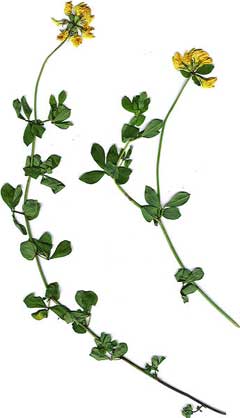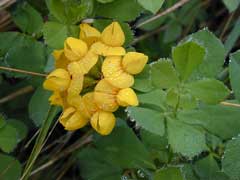 |
|
http://www.hear.org/starr/ |
 |
| http://www.hear.org/starr/ |
Translate this page:
Summary
Physical Characteristics

 Lotus uliginosus is a PERENNIAL growing to 0.4 m (1ft 4in).
Lotus uliginosus is a PERENNIAL growing to 0.4 m (1ft 4in).
See above for USDA hardiness. It is hardy to UK zone 6. It is in flower from June to September, and the seeds ripen from August to October. The species is hermaphrodite (has both male and female organs) and is pollinated by Bees.
It can fix Nitrogen.
It is noted for attracting wildlife.
Suitable for: light (sandy), medium (loamy) and heavy (clay) soils and can grow in nutritionally poor soil. Suitable pH: mildly acid, neutral and basic (mildly alkaline) soils and can grow in very acid soils.
It cannot grow in the shade. It prefers moist or wet soil.
UK Hardiness Map
US Hardiness Map
Synonyms
L. pedunculatus. Cav.
Plant Habitats
Meadow; Bog Garden;
Edible Uses
References More on Edible Uses
Medicinal Uses
Plants For A Future can not take any responsibility for any adverse effects from the use of plants. Always seek advice from a professional before using a plant medicinally.
None known
References More on Medicinal Uses
The Bookshop: Edible Plant Books
Our Latest books on Perennial Plants For Food Forests and Permaculture Gardens in paperback or digital formats.

Edible Tropical Plants
Food Forest Plants for Hotter Conditions: 250+ Plants For Tropical Food Forests & Permaculture Gardens.
More

Edible Temperate Plants
Plants for Your Food Forest: 500 Plants for Temperate Food Forests & Permaculture Gardens.
More

More Books
PFAF have eight books available in paperback and digital formats. Browse the shop for more information.
Shop Now
Other Uses
Insecticide Soil reclamation
An insecticide is obtained from the plant[153]. No more details are given. This species is used as a pioneer plant in the reclamation of peat and pumice soils and on other wet acid soils that are unsuitable for the more commonly used Trifolium spp[200]. Nitrogen Fixer.
Special Uses
Attracts Wildlife Food Forest Nitrogen Fixer
References More on Other Uses
Cultivation details
Succeeds in wet acid soils[200]. Dislikes shade[200]. Does well on poor soils[61]. Suitable for naturalistic and conservation plantings in situations that approximate to its natural habitat[200]. A good bee plant[74]. This species has a symbiotic relationship with certain soil bacteria, these bacteria form nodules on the roots and fix atmospheric nitrogen. Some of this nitrogen is utilized by the growing plant but some can also be used by other plants growing nearby[200].
References Carbon Farming Information and Carbon Sequestration Information
Temperature Converter
Type a value in the Celsius field to convert the value to Fahrenheit:
Fahrenheit:
The PFAF Bookshop
Plants For A Future have a number of books available in paperback and digital form. Book titles include Edible Plants, Edible Perennials, Edible Trees,Edible Shrubs, Woodland Gardening, and Temperate Food Forest Plants. Our new book is Food Forest Plants For Hotter Conditions (Tropical and Sub-Tropical).
Shop Now
Plant Propagation
Pre-soak the seed for 24 hours in warm water and then sow in situ in the spring or autumn. The seed usually germinates in 2 - 4 weeks at 15°c. If seed is in short supply, it can be sown in pots in a cold frame. When they are large enough to handle, prick the seedlings out into individual pots and plant them out in late spring or early summer.
Other Names
If available other names are mentioned here
Native Range
EUROPE: Denmark, United Kingdom, Ireland, Sweden, Czechoslovakia, Austria, Belgium, Switzerland, Germany, Netherlands, Poland, Estonia, Lithuania, Latvia, Ukraine (west), Former Yugoslavia, Albania, Bulgaria, Greece (incl. Crete), Italy (incl. Sardinia), Romania, Spain, France (incl. Corsica), Portugal AFRICA: Spain (Canarias (Tenerife)), Portugal (Madeira Islands), Algeria (north), Egypt (north), Libya (north), Morocco, Tunisia
Weed Potential
Right plant wrong place. We are currently updating this section.
Please note that a plant may be invasive in one area but may not in your area so it's worth checking.
Conservation Status
IUCN Red List of Threatened Plants Status :

Growth: S = slow M = medium F = fast. Soil: L = light (sandy) M = medium H = heavy (clay). pH: A = acid N = neutral B = basic (alkaline). Shade: F = full shade S = semi-shade N = no shade. Moisture: D = dry M = Moist We = wet Wa = water.
Now available:
Food Forest Plants for Mediterranean Conditions
350+ Perennial Plants For Mediterranean and Drier Food Forests and Permaculture Gardens.
[Paperback and eBook]
This is the third in Plants For A Future's series of plant guides for food forests tailored to
specific climate zones. Following volumes on temperate and tropical ecosystems, this book focuses
on species suited to Mediterranean conditions—regions with hot, dry summers and cool, wet winters,
often facing the added challenge of climate change.
Read More
Expert comment
Author
Schkuhr.
Botanical References
50200
Links / References
For a list of references used on this page please go here
Readers comment
© 2010, Plants For A Future. Plants For A Future is a charitable company limited by guarantee, registered in England and Wales. Charity No. 1057719, Company No. 3204567.